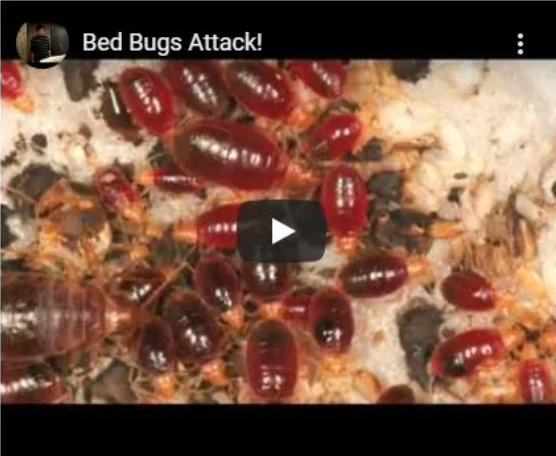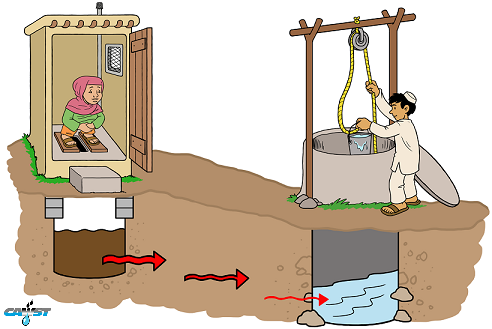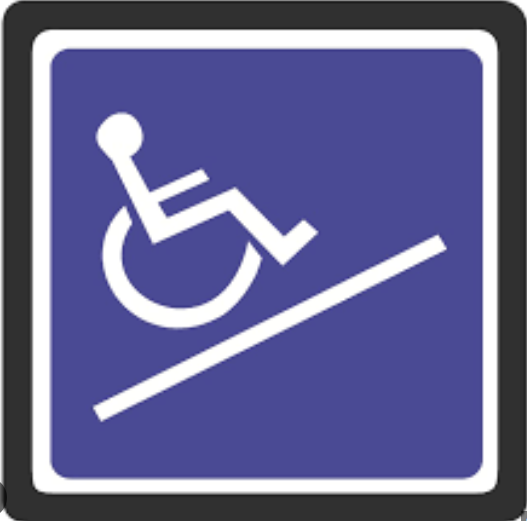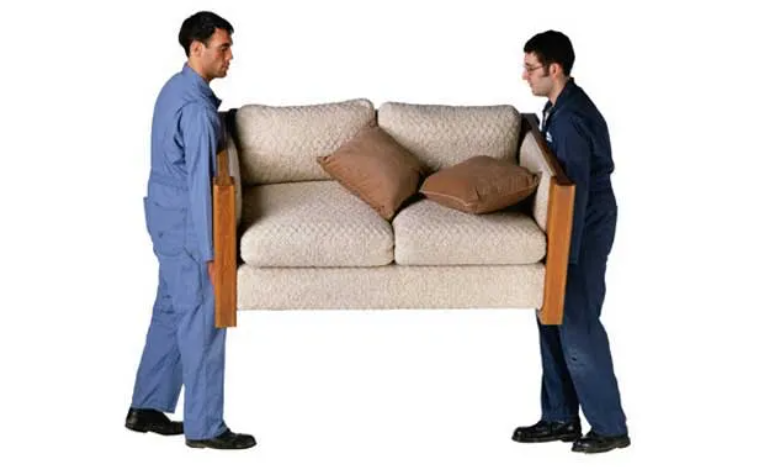Bed Bugs. Yikes!
With bed bugs, there isn't a single, standard way that the exterminator you hire will deal with them. It used to be that everyone used DDT, but that isn't an option anymore. Unlike other pests, bed bugs were nearly gone in the United States until the last decade or so. Because of this, there isn't really a "standard" treatment (such as bait for ants or termites, medicine for fleas, etc.).
By: John Sims,
Former President of Florida Pest Management
Treatment generally involves a lengthy inspection of your home, focusing on the bedroom. The exterminator will want to find all the places that they are hiding, and will use various insecticides - sprays, dusts, and aerosols are the usual methods. Baiting does not work on bedbugs.
Click For Video
I've got an exterminator coming - how can I get ready?
The biggest thing you can do to help out is to CLEAN. The exterminator is going to be searching around for them, and they can hide in tiny little cracks. If you've got junk thrown all over the place, it's going to be very hard for them to do their job. Get all the linens off the bed and wash them in hot water - it needs to get over 120 degrees Fahrenheit. Take any clothes you've had laying around in your bedroom and do the same thing (it's a good idea to do them in a separate load from the linens). Even if you can't wash something, you may be able to put it in the dryer, which can often kill them off just as well.
Don't move stuff around your house - bed bugs will hide in things other than the bed. So if you take an item from the bedroom, you might just be spreading them, and making the job harder. You can take it outside - if the current temperature is very hot or very cold, leaving infested items outside will sometimes kill them off. This method is very uncertain, though, and I'm not sure I'd risk it - you could end up having the pest control company clear your house, and then just bringing back in a couple that survived. Be aware that cold usually takes about two weeks to do the job. If you are going to move something, bag it up or wrap it before taking it outside. That makes it less likely that the bugs will flee while you're carrying it.
Vacuuming can be helpful, too, because it gets rid of the eggs and some of the bugs. You need to scrape things with the extension repeatedly, rather than just run it over the carpet. Focus on corners and edges. Take the bag immediately outside of the house. If you have a bagless vacuum, I would skip this step. Also make sure to ask the pest control specialist whether you should vacuum after they've left. Sometimes this is counterproductive - they'll put down a dust, and you just vacuum it right back up.
How do I know if I have bed bugs?
This is a tough one. It can be hard to tell if you've got them or not, because they are pretty small, only come out for very short periods, and because they are pretty good at hiding . First off, you should look for some key signs.
- Waste - Bed bugs create a lot of waste, and that is harder to hide than they are. It can consist of dark spots on your mattress (which can be blood, feces, etc.) or of shed skins, eggs, dead bed bugs, etc. You may find it inside your mattress, in the box springs, or in the linens. It looks like this:
- Bites - You should be seeing little r d bites on you without really knowing why. People rarely catch bed bugs in the act - they come out when you are asleep, and only bite for a short period. Also, like many bugs, you cannot feel the bite until a few minutes after it happens. The bites are very hard to identify - most doctors actually can't tell you for sure what they're from just by looking at them.
- Hiding places - Look in all the key spots where they could hide. This means the mattress and around it, folds in the linens, curtains, and nearby furniture. Look for the waste or dark spots. You probably won't see live ones, but they look like little mini-cockroaches.
- Catch them in the act - Keep a flashlight by your bed, and turn it on about an hour before dawn and watch the sheets closely for movement. Bed bugs usually bite around then, but if you get up or move too much they will go back into hiding. This can be hard to do - if you've only got a few of them, they only need to come out once a week or so anyway, so you might get unlucky and not see any, even though you have them.
- Carpet tape - This is a great way to do it. Get some double-sided carpet tape (it's tape designed to keep rugs stuck to the floor) and lay out strips around your bed, and on the sides of the mattress but where you won't run into it when you sleep. Leave it out for a few days. If you've got bedbugs, it's likely that at least a couple of them will get stuck on it.
Did I get bed bugs because I didn't keep my house clean?
No. This is an urban legend - people tend to think that bed bugs are attracted to people with poor hygiene or houses that are left in a mess. It doesn't matter how spotless your place is. An infestation can occur anywhere, and cleaning up won't help prevent them.
The important thing to remember here is a warning for travelers. It doesn't matter how fancy your hotel is, or how clean it looks - bed bugs aren't attracted to dirt, they want peo ple. There's obviously some correlation - a run-down hotel is less likely to pay to get them removed. But you can't just look at a place and tell that it's safe. And no matter how much you clean your own house, you won't get rid of them. They can hide in tiny crevices of your furniture or other belongings, and they'll keep after you until you get them treated.
Bed Bug Basics
So what are bed bugs, anyway?
Everyone has heard of them. They're essentially little bugs that are nocturnal and feed off human blood. There are actually a lot of different kinds, including some that feed off certain types of animals like chickens, but the ones most people are worried about live mainly off humans. They usually live inside of mattresses, where they have convenient access to a food source - you. They crawl out just before dawn and bite you, sucking out blood for about five minutes. You don't feel anything until after the bed bug is already safely back in its home.
They will usually bite once a week or so, and they can actually live for a long time without feeding - usually six months, but sometimes over a year.
Bed bugs can infest all kinds of different places in your bedroom. Most often they're in the mattress - in the seams, the box springs, or sometimes the linens. However, they can really be anywhere near where people sleep - furniture within crawling distance, carpet, books, phones - they've been found in all kinds of random things, because they don't create a nest, they just hide somewhere.
Bed bugs used to be nearly completely eliminated in the United States, Canada, and Western Europe - largely because of certain chemicals used against roaches. In recent years, however, there have been rising levels of infestations because these chemicals have been banned or restricted in most Western countries. Bed bugs have also begun to develop immunity to many of the pesticides that are still legal to use, making them much harder to kill.
Can bed bugs hurt me?
No, they aren't actually dangerous. However, the bites are annoying and they can cause skin irritation and rashes, especially if you've got a lot of them in the mattress. So it's always a good idea to get rid of them - because each bug can lay four or five eggs a day, leading to a pretty big batch of them if you leave things alone.
How did I get bed bugs in my house?
Lots of people who find that they have bedbugs wonder where the heck they got them from. There are a couple of common ways you can get an infestation:
- Living in an apartment. Bed bugs often live or crawl in the spaces in between walls as well, and if your neighbors have them, you could as well. That also can make it harder for you to permanently get rid of them, since you've got a potential source until your neighbors take care of their own infestation.
- Travel . Many hotels have infestations. With international travel, this is even more likely. Bed bugs will often crawl into your luggage and get carried back into your home, and all it takes is one to get an infestation started there, too.
- Clothing . Sometimes they could get into your house by crawling onto your clothes randomly - but this is actually pretty rare.
- Used furniture or clothing . This is more common - if you buy used clothes or used furniture, sometimes there can be bed bugs in them (they don't just live in beds, but anywhere near where people sleep). If you bought something used and bring it into your house, that could be where you picked up your own set of bugs.
- Your occupation. If you regularly go into other people's houses for some reason, you could easily bring bed bugs back with you that way. If you're the cable guy, a plumber, or anybody who goes into other people's houses, you're at risk.
- Guests . If someone stays at your house, they could bring them over with them. One big source of this is students coming home for the holidays - the dorm rooms could easily pick up an infestation given how many people are coming in and out all the time from all over.
- Wild animals . This is a kind of rare way people have gotten them, but sometimes people have had animals get into their house for a short period and bring them in with them. Birds and bats are the most common offenders.
The exterminator isn't coming for days - what can I do to keep until then?
It may take awhile for you to get your bed bug problem taken care of. Even if you get the pest control guy in the next day, it can take a long time to finally get rid of the infestation, and you don't want to be bitten in the meantime. Here's what you should do:
- Get a mattress cover. These will lock any that are in your mattress (the main hiding place) in there. That alone will cut down on the bites.
- Wash all your sheets regularly. If you can wash your pillows, do that too. If you can't, then get a pillow cover (they're discussed on the mattress cover page).
- Get some double-sided tape. Make a little barrier all the way around the side of your mattress. This is essentially a bed bug trap - if they try to crawl up the side, they'll get stuck. . Make it at least a couple of strips wide - and make sure it's above any zipper, etc. on the mattress cover. Anything that crawls on the tape can also be useful to help the exterminator identify them. To do this, you can't have any sheets or anything hanging over it - wherever the tape is, there can't be a way for them to crawl up. If it connects to the headboards, etc., then you need to put tape there, too - basically you want an unbroken barrier of tape as much as possible.
These things alone will cut down on your bites a ton. They won't kill off the infestation. You have to have an exterminator to do that. But whatever you do, don't panic. Don't toss all your furniture, don't go sleep in another room or at someone else's house (you'll spread them) - basically, don't do much else until you've consulted with an exterminator.
###
John Sims is the former President of Florida Pest Management .
John is an expert on the subject of pest control and specializes in pest problems in rental property.
He is also a landlord, prolific author and speaker.
He may be reached at: johnsimsgm@gmail.com
































